反义疑问句
- 格式:doc
- 大小:52.50 KB
- 文档页数:5
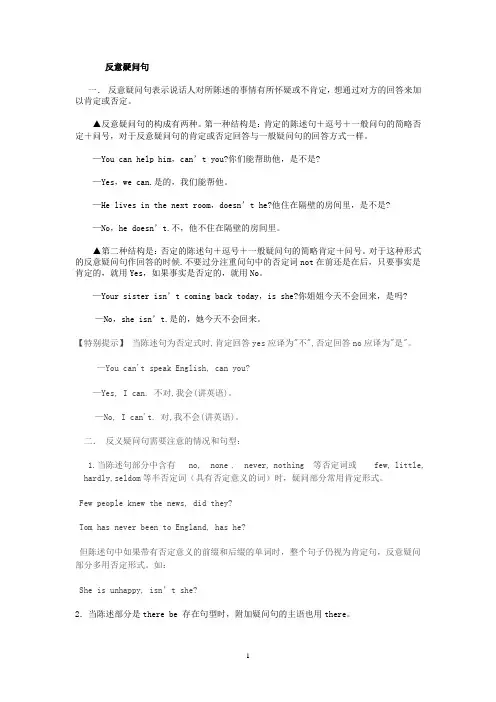
反意疑问句一.反意疑问句表示说话人对所陈述的事情有所怀疑或不肯定,想通过对方的回答来加以肯定或否定。
▲反意疑问句的构成有两种。
第一种结构是:肯定的陈述句+逗号+一般问句的简略否定+问号,对于反意疑问句的肯定或否定回答与一般疑问句的回答方式一样。
—You can help him,can’t you?你们能帮助他,是不是?—Yes,we can.是的,我们能帮他。
—He lives in the next room,doesn’t he?他住在隔壁的房间里,是不是?—No,he doesn’t.不,他不住在隔壁的房间里。
▲第二种结构是:否定的陈述句+逗号+一般疑问句的简略肯定+问号。
对于这种形式的反意疑问句作回答的时候.不要过分注重问句中的否定词not在前还是在后,只要事实是肯定的,就用Yes,如果事实是否定的,就用No。
—Your sister isn’t coming back today,is she?你姐姐今天不会回来,是吗?—No,she isn’t.是的,她今天不会回来。
【特别提示】当陈述句为否定式时,肯定回答yes应译为"不",否定回答no应译为"是"。
—You can't speak English, can you?—Yes, I can. 不对,我会(讲英语)。
—No, I can't. 对,我不会(讲英语)。
二.反义疑问句需要注意的情况和句型:1.当陈述句部分中含有 no, none , never, nothing 等否定词或 few, little, hardly,seldom等半否定词(具有否定意义的词)时,疑问部分常用肯定形式。
Few people knew the news, did they?Tom has never been to England, has he?但陈述句中如果带有否定意义的前缀和后缀的单词时,整个句子仍视为肯定句,反意疑问部分多用否定形式。
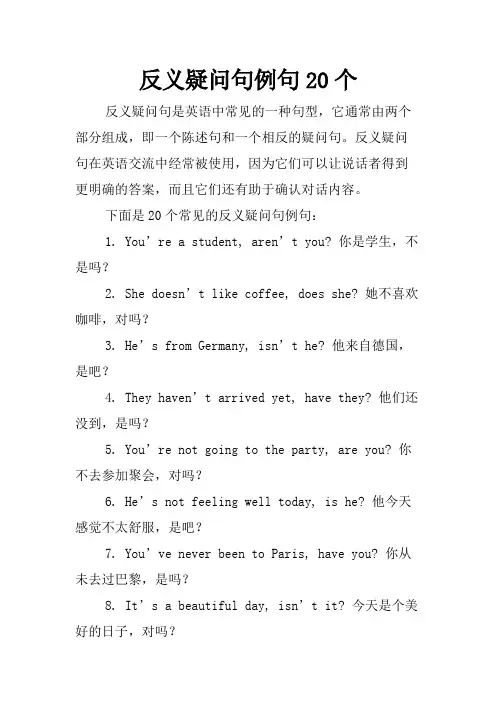
反义疑问句例句20个反义疑问句是英语中常见的一种句型,它通常由两个部分组成,即一个陈述句和一个相反的疑问句。
反义疑问句在英语交流中经常被使用,因为它们可以让说话者得到更明确的答案,而且它们还有助于确认对话内容。
下面是20个常见的反义疑问句例句:1. You’re a student, aren’t you? 你是学生,不是吗?2. She doesn’t like coffee, does she? 她不喜欢咖啡,对吗?3. He’s from Germany, isn’t he? 他来自德国,是吧?4. They haven’t arrived yet, have they? 他们还没到,是吗?5. You’re not going to the party, are you? 你不去参加聚会,对吗?6. He’s not feeling well today, is he? 他今天感觉不太舒服,是吧?7. You’ve never been to Paris, have you? 你从未去过巴黎,是吗?8. It’s a beautiful day, isn’t it? 今天是个美好的日子,对吗?9. He can’t swim, can he? 他不会游泳,对吗?10. She doesn’t like pizza, does she? 她不喜欢披萨,对吗?11. You’re not afraid of heights, are you? 你不怕高,对吗?12. They won’t be able to attend the meeting, will they? 他们不能参加会议,对吗?13. They’re leaving tomorrow, aren’t they? 他们明天要走了,对吗?14. He’s never been skiing, has he? 他从未滑过雪,对吗?15. She’s not going to the concert, is she? 她不去音乐会,对吗?16. You’re not worried about the exam, are you? 你不担心考试吧,对吗?17. He didn’t eat breakfast this morning, did he? 他今天早上没吃早餐,对吗?18. They’r e not going to the beach, are they? 他们不去海边,对吗?19. You’ve already seen the movie, haven’t you? 你已经看过这部电影了,对吗?20. He’s not coming to the party, is he? 他不来参加聚会,对吗?在使用反义疑问句时,需要注意的是,它们并不总是表示对话者的不确定或疑虑。
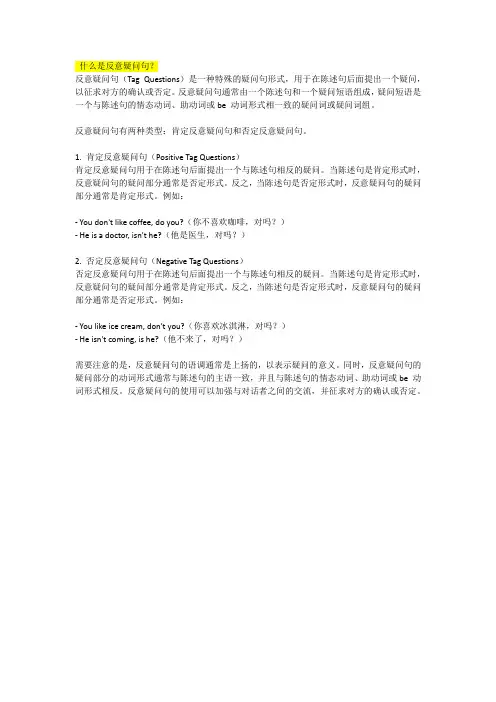
什么是反意疑问句?反意疑问句(Tag Questions)是一种特殊的疑问句形式,用于在陈述句后面提出一个疑问,以征求对方的确认或否定。
反意疑问句通常由一个陈述句和一个疑问短语组成,疑问短语是一个与陈述句的情态动词、助动词或be 动词形式相一致的疑问词或疑问词组。
反意疑问句有两种类型:肯定反意疑问句和否定反意疑问句。
1. 肯定反意疑问句(Positive Tag Questions)肯定反意疑问句用于在陈述句后面提出一个与陈述句相反的疑问。
当陈述句是肯定形式时,反意疑问句的疑问部分通常是否定形式。
反之,当陈述句是否定形式时,反意疑问句的疑问部分通常是肯定形式。
例如:- You don't like coffee, do you?(你不喜欢咖啡,对吗?)- He is a doctor, isn't he?(他是医生,对吗?)2. 否定反意疑问句(Negative Tag Questions)否定反意疑问句用于在陈述句后面提出一个与陈述句相反的疑问。
当陈述句是肯定形式时,反意疑问句的疑问部分通常是肯定形式。
反之,当陈述句是否定形式时,反意疑问句的疑问部分通常是否定形式。
例如:- You like ice cream, don't you?(你喜欢冰淇淋,对吗?)- He isn't coming, is he?(他不来了,对吗?)需要注意的是,反意疑问句的语调通常是上扬的,以表示疑问的意义。
同时,反意疑问句的疑问部分的动词形式通常与陈述句的主语一致,并且与陈述句的情态动词、助动词或be 动词形式相反。
反意疑问句的使用可以加强与对话者之间的交流,并征求对方的确认或否定。

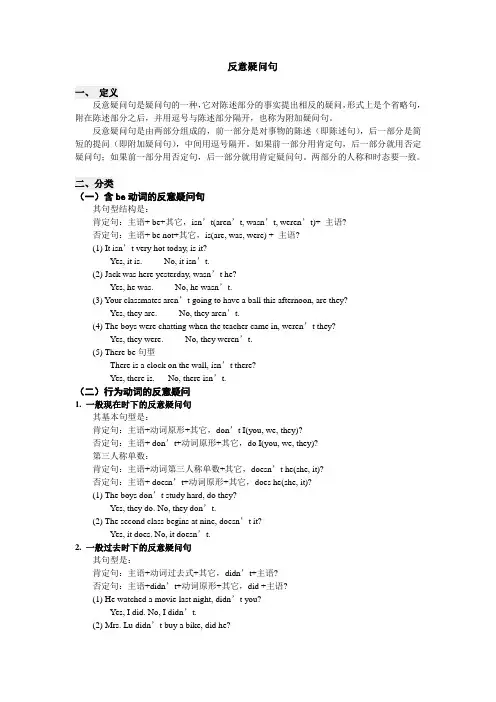
反意疑问句一、定义反意疑问句是疑问句的一种,它对陈述部分的事实提出相反的疑问,形式上是个省略句,附在陈述部分之后,并用逗号与陈述部分隔开,也称为附加疑问句。
反意疑问句是由两部分组成的,前一部分是对事物的陈述(即陈述句),后一部分是简短的提问(即附加疑问句),中间用逗号隔开。
如果前一部分用肯定句,后一部分就用否定疑问句;如果前一部分用否定句,后一部分就用肯定疑问句。
两部分的人称和时态要一致。
二、分类(一)含be动词的反意疑问句其句型结构是:肯定句:主语+ be+其它,isn’t(aren’t, wasn’t, weren’t)+ 主语?否定句:主语+ be not+其它,is(are, was, were) + 主语?(1) It isn’t very hot today, is it?Yes, it is.No, it isn’t.(2) Jack was here yesterday, wasn’t he?Yes, he was. No, he wasn’t.(3) Your classmates aren’t going to have a ball this afternoon, are they?Yes, they are.No, they aren’t.(4) The boys were chatting when the teacher came in, weren’t they?Yes, they were.No, they weren’t.(5) There be句型There is a clock on the wall, isn’t there?Yes, there is.No, there isn’t.(二)行为动词的反意疑问1. 一般现在时下的反意疑问句其基本句型是:肯定句:主语+动词原形+其它,don’t I(you, we, they)?否定句:主语+ don’t+动词原形+其它,do I(you, we, they)?第三人称单数:肯定句:主语+动词第三人称单数+其它,doesn’t he(she, it)?否定句:主语+ doesn’t+动词原形+其它,does he(she, it)?(1) The boys don’t study hard, do they?Yes, they do. No, they don’t.(2) The second class begins at nine, doesn’t it?Yes, it does. No, it doesn’t.2. 一般过去时下的反意疑问句其句型是:肯定句:主语+动词过去式+其它,didn’t+主语?否定句:主语+didn’t+动词原形+其它,did +主语?(1) He watched a movie last night, didn’t you?Yes, I did. No, I didn’t.(2) Mrs. Lu didn’t buy a bike, did he?Yes, he did. No, he didn’t.3. 一般将来时下的反意疑问句其句型是:肯定句:主语+will+动词原形+其它,won’t+主语?否定句:主语+ won’t +动词原形+其它,will +主语?(1) It won’t stop snowing, will it?Yes, it will. No, it won’t.③Mr. Johnson will visit our school next month, won’t he?Yes, he will. No, he won’t.4. 现在完成时下的反意疑问句其句型是:肯定句:主语+have+动词过去分词+其它,haven’t+主语?否定句:主语+ haven’t +动词过去分词+其它,have +主语?第三人称单数肯定句:主语+has+动词过去分词+其它,hasn’t+主语?否定句:主语+ hasn’t +动词过去分词+其它,has +主语?(1) You have been to the US before, haven’t you?Yes I have. No, I haven’t.(2) Jim hasn’t done his homework, has he?Yes, he has. No, he hasn’t.5. 含有情态动词的反意疑问句其句型是:肯定句:主语+情态动词+动词原形+其它,情态动词否定形式+主语?否定句:主语+情态动词否定形式+动词原形+其它,情态动词+主语?(1) You can speak French, can’t you?Yes, I can. No, I can’t.(2) Andy could swim when he was six, couldn’t he?Yes, he could. No, he couldn’t.(3) The students must study hard, mustn’t they?Yes, they must. No, they needn’t.三、反意疑问句应注意的问题1. 当陈述部分的主语是everybody, everyone, someone, nobody, somebody等不定代词时,反意疑问句部分中的主语常用they。
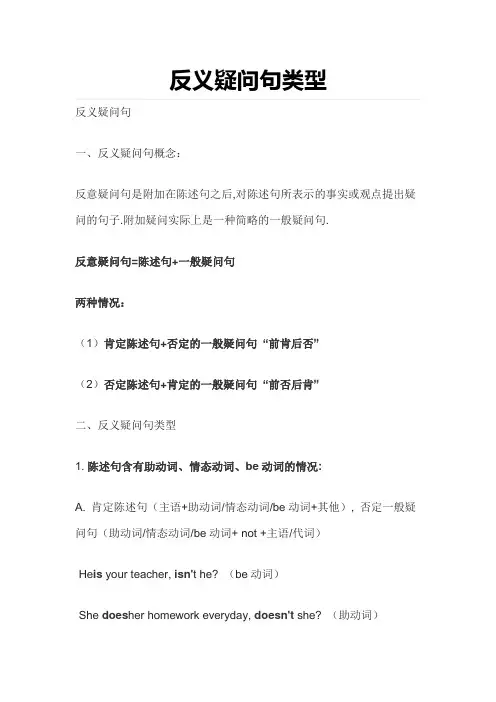
反义疑问句一、反义疑问句概念:反意疑问句是附加在陈述句之后,对陈述句所表示的事实或观点提出疑问的句子.附加疑问实际上是一种简略的一般疑问句.反意疑问句=陈述句+一般疑问句两种情况:(1)肯定陈述句+否定的一般疑问句“前肯后否”(2)否定陈述句+肯定的一般疑问句“前否后肯”二、反义疑问句类型1. 陈述句含有助动词、情态动词、be动词的情况:A. 肯定陈述句(主语+助动词/情态动词/be动词+其他), 否定一般疑问句(助动词/情态动词/be动词+ not +主语/代词)·He is your teacher, isn't he? (be动词)·She does her homework everyday, doesn't she? (助动词)·They have a house in town, haven't they? (情态动词)·You'd better change your wet skirt, hadn't you? (情态动词)B. 否定陈述句(主语+助动词/情态动词/be动词),肯定一般疑问句(助动词/情态动词/be动词+ not +主语/代词)People shouldn't drop litter on the pavements, should they?(情态动词)There wasn't enough time at that moment, was there? (be动词)He doesn't do the work, does he? (助动词)2. 陈述句含有实义动词的情况:A. 肯定陈述句(主语+实义动词+其他),否定的一般疑问句(助动词do/does/did + not +主语/代词)·You found the key in the bedroom,didn't you?·Everybody knows the answer, don't they?B. 否定陈述句(主语+do/does/did + not+实义动+其他),肯定的一般疑问句(助动词do/does/did+主语/代词+其他)·Your mother doesn't like apple, does she?3. 特殊句型的反意疑问句(1)陈述句含有I +be动词句型,附加疑问句用are / aren't+ I回答。
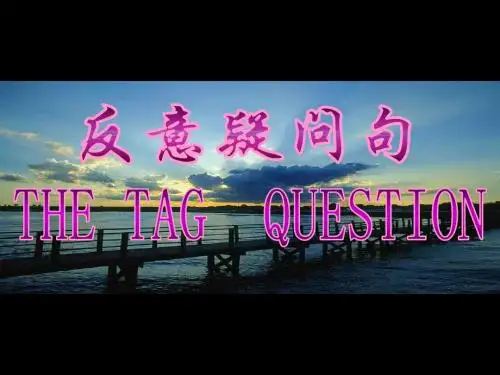
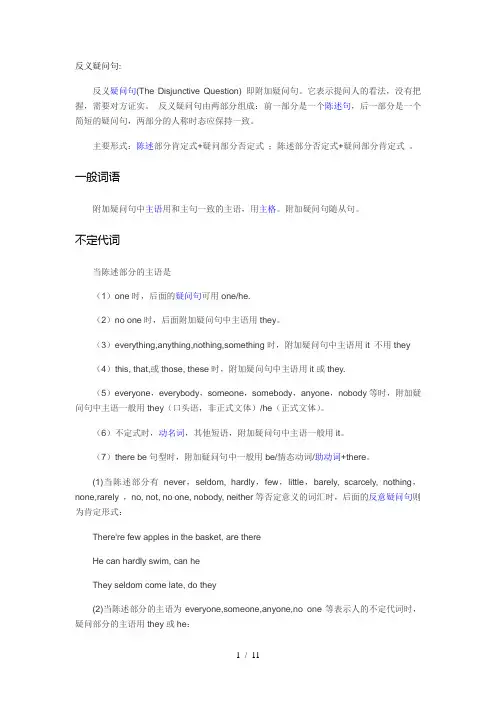
反义疑问句:反义疑问句(The Disjunctive Question) 即附加疑问句。
它表示提问人的看法,没有把握,需要对方证实。
反义疑问句由两部分组成:前一部分是一个陈述句,后一部分是一个简短的疑问句,两部分的人称时态应保持一致。
主要形式:陈述部分肯定式+疑问部分否定式;陈述部分否定式+疑问部分肯定式。
一般词语附加疑问句中主语用和主句一致的主语,用主格。
附加疑问句随从句。
不定代词当陈述部分的主语是(1)one时,后面的疑问句可用one/he.(2)no one时,后面附加疑问句中主语用they。
(3)everything,anything,nothing,something时,附加疑问句中主语用it 不用they(4)this, that,或those, these时,附加疑问句中主语用it或they.(5)everyone,everybody,someone,somebody,anyone,nobody等时,附加疑问句中主语一般用they(口头语,非正式文体)/he(正式文体)。
(6)不定式时,动名词,其他短语,附加疑问句中主语一般用it。
(7)there be句型时,附加疑问句中一般用be/情态动词/助动词+there。
(1)当陈述部分有never,seldom, hardly,few,little,barely, scarcely, nothing,none,rarely ,no, not, no one, nobody, neither等否定意义的词汇时,后面的反意疑问句则为肯定形式:There're few apples in the basket, are thereHe can hardly swim, can heThey seldom come late, do they(2)当陈述部分的主语为everyone,someone,anyone,no one等表示人的不定代词时,疑问部分的主语用they或he:Everyone in your family is a teacher, aren’t they\isn't he?(3)当陈述部分的主语为everything,something,anything.nothing等表示物的不定代词时,疑问部分的主语用it:Something is wrong with your watch, isn’t it(4)当陈述部分含有否定意思的词是unhappy,dislike,unfriendly,等含有否定词缀的派生词,也就是有un,dis,no-前缀、-less后缀等含有词缀而意思否定的词,当做肯定句处理,疑问部分要用否定形式。
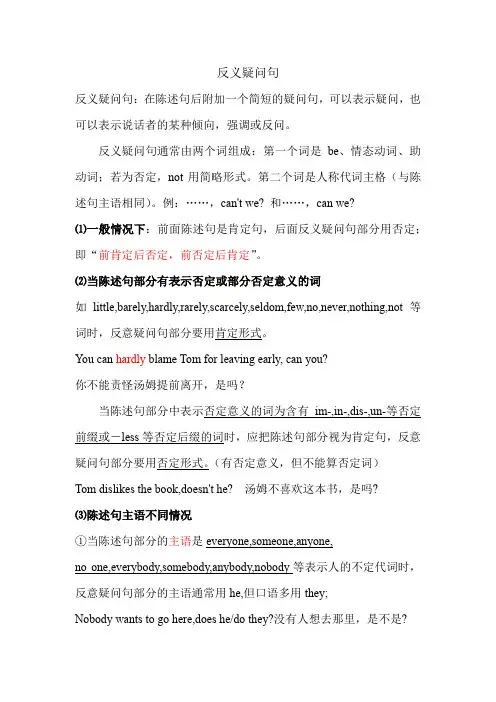
反义疑问句反义疑问句:在陈述句后附加一个简短的疑问句,可以表示疑问,也可以表示说话者的某种倾向,强调或反问。
反义疑问句通常由两个词组成:第一个词是be、情态动词、助动词;若为否定,not用简略形式。
第二个词是人称代词主格(与陈述句主语相同)。
例:……,can't we? 和……,can we?⑴一般情况下:前面陈述句是肯定句,后面反义疑问句部分用否定;即“前肯定后否定,前否定后肯定”。
⑵当陈述句部分有表示否定或部分否定意义的词如little,barely,hardly,rarely,scarcely,seldom,few,no,never,nothing,not等词时,反意疑问句部分要用肯定形式。
You can hardly blame Tom for leaving early, can you?你不能责怪汤姆提前离开,是吗?当陈述句部分中表示否定意义的词为含有im-,in-,dis-,un-等否定前缀或-less等否定后缀的词时,应把陈述句部分视为肯定句,反意疑问句部分要用否定形式。
(有否定意义,但不能算否定词)Tom dislikes the book,doesn't he? 汤姆不喜欢这本书,是吗?⑶陈述句主语不同情况①当陈述句部分的主语是everyone,someone,anyone,no one,everybody,somebody,anybody,nobody等表示人的不定代词时,反意疑问句部分的主语通常用he,但口语多用they;Nobody wants to go here,does he/do they?没有人想去那里,是不是?②当陈述句部分的主语是anything,everything,nothing,something 等表示物的不定代词时,反意疑问句部分的主语常用it.Everying seems all right now,doesn't it?似乎一切顺利,是不是?②当陈述句部分的主语是I 时,反意疑问句部分的主语常用aren't I.若表示征询对方意见时,疑问句部分用do you.I am healthy,aren't I?我很健康,对吗?I don't like this film,do you?我不喜欢这部电影,你呢?④当陈述句部分的主语是不定式(短语)或动名词(短语)时,反意疑问句部分的主语常用it.Learning English well takes a long time,doesn't it?学好英语需要好长时间,是不是?②当陈述部分的主语是指示代词this /that或these /those时,疑问句中的主语分别用it或theyThis is important, isn't it? 此事很重要,是不是?②如果陈述部分是以代词one作主语疑问句的主语,在正式场合用one 非正式场合用you在美国英语中非正式场合下,还可以用heOne cannot be too careful, can one /can you? 越仔细越好,对不对?②陈述部分有neither…nor 或both …and连接两个主语时,疑问句部分的主语常用复数形式。

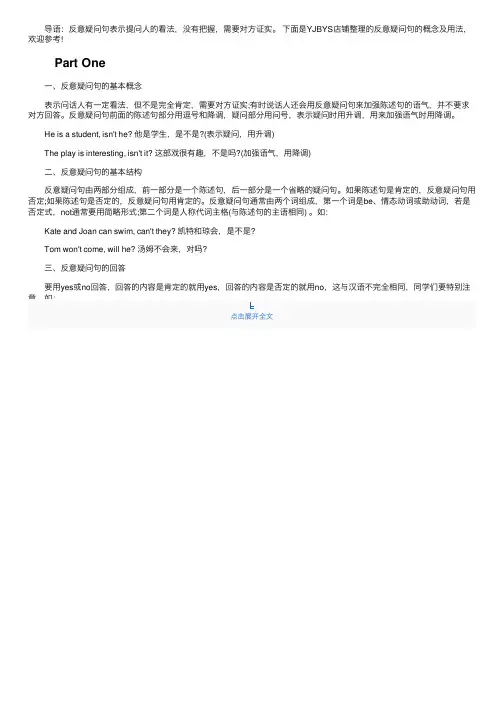
导语:反意疑问句表⽰提问⼈的看法,没有把握,需要对⽅证实。
下⾯是YJBYS店铺整理的反意疑问句的概念及⽤法,欢迎参考!
Part One
⼀、反意疑问句的基本概念
表⽰问话⼈有⼀定看法,但不是完全肯定,需要对⽅证实;有时说话⼈还会⽤反意疑问句来加强陈述句的语⽓,并不要求对⽅回答。
反意疑问句前⾯的陈述句部分⽤逗号和降调,疑问部分⽤问号,表⽰疑问时⽤升调,⽤来加强语⽓时⽤降调。
He is a student, isn't he? 他是学⽣,是不是?(表⽰疑问,⽤升调)
The play is interesting, isn't it? 这部戏很有趣,不是吗?(加强语⽓,⽤降调)
⼆、反意疑问句的基本结构
反意疑问句由两部分组成,前⼀部分是⼀个陈述句,后⼀部分是⼀个省略的疑问句。
如果陈述句是肯定的,反意疑问句⽤否定;如果陈述句是否定的,反意疑问句⽤肯定的。
反意疑问句通常由两个词组成,第⼀个词是be、情态动词或助动词,若是否定式,not通常要⽤简略形式;第⼆个词是⼈称代词主格(与陈述句的主语相同) 。
如:
Kate and Joan can swim, can't they? 凯特和琼会,是不是?
Tom won't come, will he? 汤姆不会来,对吗?
三、反意疑问句的回答
要⽤yes或no回答,回答的内容是肯定的就⽤yes,回答的内容是否定的就⽤no,这与汉语不完全相同,同学们要特别注意。
如:
点击展开全⽂
—You will never forget him, will you? 你永远不会忘记他,是吗?。
反义疑问句一.句型解释反义疑问句(The Disjunctive Question):即附加疑问句。
它表示提问人的看法,没有把握,需要对方证实。
反义疑问句由两部分组成:前一部分是一个陈述句,后一部分是一个简短的疑问句,两部分的人称时态应保持一致。
1.陈述部分肯定式+疑问部分否定式2.陈述部分否定式+疑问部分肯定式She was ill yesterday, wasn’t she?You didn’t go, did you?二.特殊的句型1.祈使句。
祈使句后一般加上will you或won't you构成反意疑问句,用will you 多表示“请求”,用won't you 多表示提醒对方注意。
例如:Let引导的祈使句有两种情况:1) Let's...,后的反意疑问句用shall we或shan't we。
例如:Let's go home, shall we/ shan't we? 回家吧,好吗?2)Let us/me...后的反意疑问句用will you或won't you。
例如:Let me have a try, will you/won't you?3)祈使句都用will you 或won’t you2.当陈述部分含I think (believe, suppose...)that... 结构时,其反意疑问句须与从句的主、谓语保持一致,注意主句的主语必须是第一人称。
例如:I don't think he will come, will he?若是非第一人称,则与主句的主语相一致He thinks that she will come, doesn’t he?反意疑问句的陈述部分为I(We) don’t think(believe, suppose, consider)+ that从句时,从句为否定意义,问句部分的动词和主语仍与that从句保持一致且用肯定式。
反义疑问句(含解析、例句及详尽用法)-CAL-FENGHAI.-(YICAI)-Company One1反义疑问句一、祈使句的反义疑问句1、肯定祈使句Will you/won’t you2、否定祈使句Will you3、Let的祈使句Let us ...,will you(此处Let us 表示“允许我们...”)Let’s...,shall we (此处Let’s表示“让我们...吧”)Let + 第三人称...,will you二、Must的反义疑问句1、表示“必须” musn’t /needn’tEg. You must go now, needn’t you2、表示“不准”Eg. You musn’t smoke here, must/may you3、表示推测,肯定。
(I’m sure + 从句)Eg. You must be hungry now, aren’t youI’m sure you are hungry now, aren’t youShe must have heard about that, hasn’t sheI’m sure you have heard about that, haven’t youYou must have watched that movie last night, didn’t you(last nigh为具体时间点,所以用一般过去式)三、主语(反义疑问句)+从句主句:I(don’t)think/believe/consider/suppose 或 I’m afraid/sure...后跟从句时,可将从句部分进行反义疑问Eg. I don’t think he will win, will heI think he will win, won’t heShe thinks he will win, doesn’t she(当主句主语不是I时不适用于该用法,此句中的翻译疑问针对的是主句而非从句)四、当句中包含有表示否定意义的副词或不定代词时,反义疑问句用肯定形式Eg. Nothing happened to him, did itIt is unfair, isn’t itHe dislikes watching TV, doesn’t he(该句中含否定意义的是动词而非副词或不定代词,因此不适用于该用法,反义疑问句仍然使用否定形式)五、反义疑问句的回答反义疑问句的回答针对被提问部分的谓语动词,且与回答句前部分的Yes和No 保持一致Eg. A: You haven’t lost the ticket, have youB: D I know it’s hard to get another one at this moment.A. Yes, I haven’tB. No, I haveC. I hope soD. I’m afraid not六、陈述部分的主语与反义疑问句主语保持一致的情况1、OneEg. One can’t be too careful when driving a car, can one/he一个人在开车的时候再怎么小心也不为过。
反意疑问句一、定义:当我们陈述了一个事实,而又不是很有把握,就可以在陈述句后加一个简短问句,称为反意疑问句。
例:1. She is a student, isn’t she?2. We speak Chinese, don’t we?二、反意疑问句构成:助动词/系动词(肯定或否定)+主语(代词)?注意:1.前面的陈述句如果是肯定的,反意疑问句就要用否定形式;前面的陈述句如果是否定的,反意疑问句就要用肯定形式;前肯,+ 后否? /前否,+ 后肯?2.反意疑问句的主语必须是代替前面主语的代词;3.反意疑问句的谓语动词在时态和人称上要与前面陈述句的谓语动词保持一致;4.陈述句部分如果有表否定意义的词,反意疑问句要用肯定形式;例如: He was hardly twelve then, was he?5.在回答反意疑问句时,要注意英汉两种语言习惯的差别如何回答三、反意疑问句的解答步骤1. 判定(判断该用肯定还是否定);2. 找动(找句子的助动词:be用be,动词原形do,三单does过去did,完成have);3. 换代(将主语换为代词主格形式);找动词1、Be动词1.It’s a nice day , isn’t it ?2.The Greens were at home last night , weren’t they ?3.Ben isn’t a bed boy , is he ?4.Tom is skating , isn’t he ?2、助动词1.找到动词2.判断肯否、时态及助动词3.主语照抄(若是名词便改为代词主格形式)例如:Tina speaks English well , doesn’t she ?1) 找到动词是speaks2) 判断:肯定、一般现在时助动词用does3) 主语:(tina是名词女名则改为she)3、情态动词像can/will等情态动词,变为否定为can’t/won’t即可当h ave 在完成时中或“You had better”中时,也当情态动词变。
反义疑问句1. 反意疑问句的定义反意疑问句又叫附加疑问句,是指当提问的人对前面所叙述的事实不敢肯定,而需要向对方加以证实时所提出的问句。
2. 反意疑问句的构成其结构为:前一部分是一个陈述句,后一部分是一个简单的问句。
它由“助动词/情态动词或系动词be(肯定或否定)+主语(代词)”构成。
3. 反意疑问句构成应注意以下几点:①前面的陈述句如果是肯定的,反意疑问句就要用否定形式;如果是否定的,反意疑问句就用肯定形式。
eg. You like classical music, don’t you?This music isn’t very popular, is it?②助动词/情态动词或be动词在人称和时态要与陈述句的谓语动词保持一致。
③反意疑问句中的主语必须是代替前面主语的代词。
还要注意:①陈述句部分如果含有否定意义的词(nothing,no,nobody hardly, never,little, few,seldom等),反问句要用肯定式。
He has nothing left, __?They have never been to school, _____?He hasn’t got any apples,_____?He doesn’t have any apples, ____?He has little apples,_______? (仔细思考have/has 在句子中是助动词还是实义动词)答案:1. doeshe 2. have they 3. has he 4. does he 5. does he②当句子为祈使句时,反问句一般用will you。
Drive more slowly, will you?Speak loudly, _____?Don’t smoke, _____?Let us go home, ______?当祈使句为Let’s…结构时,则用shall we。
Let’s go to the cinema, shall we?我们去看电影,好吗?当陈述部分的主语是(1)用one时,用one/he.(2)this, that,或those, these时,用it或they. (3)everything,anything,nothing,something时,用it 不用they(4)everyone,everybody,someone,somebody,anyone,nobody等,用he/they(5)不定式to do ,动名词doing,其他短语,用it。
反义疑问句的用法反义疑问句(The Disjunctive Question 或 Question tags) 即附加疑问句。
它表示提问人的看法,没有把握,需要对方证实。
以下是由店铺整理关于反义疑问句的用法,提供给大家参考和了解,希望大家喜欢!一、反意疑问句的简介英语中,反意疑问句是由陈述句和附在其后的附加疑问句组成。
其中附加疑问句是对陈述句所说的事实或观点提出疑问,起证实作用,一般用于证实说话者所说的事实或观点。
二、反意疑问句用法说明注意:反意疑问句前后两部分谓语应是,“肯定陈述+否定疑问”或“否定陈述+肯定疑问”简略问句如果是否定式,not应与be,do,will等系动词、助动词、情态动词缩写简略问句的主语不用名词,应用人称代词当说话者的目的不在疑问,而是为了加强语气时,用降调当说话者的目的在疑问,则用升调陈述部分含“too...to”时,是否定句1) 陈述部分的主语是I,疑问部分要用 aren't I.I'm as tall as your sister,aren't I?(我和你姐姐一样高,对吗?)2) 陈述部分的谓语是wish,疑问部分要用may +主语。
I wish to have a word with you, may I?(我希望可以和你说话,可以吗?)3) 陈述部分用 no, nothing, nobody, never, few, seldom, hardly, rarely, little等否定含义的词时,疑问部分用肯定含义。
The Swede made no answer, did he / she?Some plants never blown (开花), do they ?4) 含有ought to 的反意疑问句,陈述部分是肯定的,疑问部分用shouldn't / oughtn't +主语。
He ought to know what to do, oughtn't he? / shouldn't he?5) 陈述部分有have to +v. (had to + v.),疑问部分常用don't +主语(didn't +主语)。
英语反义疑问句的用法归纳总结反义疑问句是一种常见的句子结构,用于向对方确认或请求确认某一信息,通常由一个陈述句和一个疑问句构成,两者之间存在反义关系。
以下是英语反义疑问句的用法归纳总结:1. 肯定陈述句+ 否定疑问句:- 陈述句的动词为肯定形式,疑问句的动词为否定形式。
- 用于征求对方的同意、确认或补充信息。
- 例如:- You're coming to the party, aren't you?(你会来参加派对的,对吗?)- He likes ice cream, doesn't he?(他喜欢冰淇淋,对吗?)2. 否定陈述句+ 肯定疑问句:- 陈述句的动词为否定形式,疑问句的动词为肯定形式。
- 用于征求对方的同意、确认或补充信息。
- 例如:- She isn't coming to the meeting, is she?(她不会来参加会议,对吗?)- They haven't seen that movie, have they?(他们没有看过那部电影,对吗?)3. 陈述句为I am(I'm)+ 否定疑问句:- 陈述句中的"am" 可以缩写为"I'm"。
- 用于确认对方是否同意陈述的事实。
- 例如:- I'm late, aren't I?(我迟到了,对吗?)4. 陈述句中有情态动词+ 肯定疑问句:- 陈述句中有情态动词(如can, could, will, would, should, must等),疑问句的情态动词要与陈述句保持一致。
- 用于确认对方是否同意或能够遵从陈述中的情态动词。
- 例如:- He can swim, can't he?(他会游泳,对吗?)- You will help me, won't you?(你会帮助我,对吗?)5. 陈述句中没有情态动词+ 肯定疑问句:- 陈述句中没有情态动词,疑问句使用"do/does/did" 作为助动词,并保持句子时态一致。
反义疑问句注意一、反义疑问句是疑问句的一种,它对陈述部分的事实提出相反的疑问,形式上是一个省略问句,附加在陈述句后,即:陈述句 + 逗号 + 省略问句 + 问号You are from America, aren’t you?注意二、遵循前否定后肯定或前肯定后否定的原则(但在祈使句等一些特殊句子中需注意,详细见注意六)Jim isn’t in Class Four, is he?注意三、附加疑问句必须前后两句主语相同,且后一个主语必须以代词形式出现。
Mr Zhang has been here for four years, hasn’t he?1. this 或that改it,无论是否指人This is your brother, isn’t it?2. these或those改theyThose are books ,aren’t they?3. 不定代词one改heOne can’t be always y oung, can he?4. something、anything、everything和nothing改itNothing is serious, is it? (注意为什么后面用is it而不是isn’t it?)Everything seems all right, doesn’t it?5. everybody、everyone、somebody、someone、anybody、anyone、nobody改they或he(任选,但选定后注意单复数形式)Everyone knows this, don’t they / doesn’t he?Nobody likes to lose money, does he? (这里最好用he)6.each of改he或theyEach of the boys had an apple, didn’t he / they?7. no one, none, neither, either改they 或heNo one came, did they?8. some of…、none of …改it、they或you(联系上下文或句子)None of the food was delicious, was it?Some of the dustmen have come back, haven’t they?9. 由neither…nor…、not only…but also、both…and…、either…or…、not…but…、…or…、…and…等连接的并列主语,改复数代词Neither you nor I am wrong, are we?Both Tom and Jack came, didn’t the y?10. 由动词不定式、动名词、从句或词组构成的主语,改itTo learn English well isn’t easy, is it?Swimming is great fun, isn’t it?11. the + 形容词表示一类人,改复数代词The poor had no right (权力) to speak at the time, did they?12. there 引起的句子(There be句型等),仍用thereThere sta nds a house and a lot of trees, doesn’t there?There are many children in the park, aren’t there?12. “must be”对现在情况进行推测作一般现在时或现在进行时的附加疑问句进行处理must表示“必须”,反意疑问句部分为mustn’t…? / needn’t…?He must study hard at English, mustn’t he? / needn’t he?You must go home now, needn’t you? / mustn’t you?Must表示推测:(总之,根据实际时态情况进行反问。
)①must be 对现在情况进行推测You must be joking, aren’t you?He must be ill, isn’t he ?②must have done (对过去推测)有过去时间状语He must have come yesterday, didn’t he ?③must have done (由过去延续到现在)He must have lived here at least 10 years , hasn’t he ?④must have been(对过去状态的推测)He must have been a policeman, wasn’t he?注意六、一些特殊句型的附加疑问句1. I am…改aren’t II am your friend, aren’t I?2. I wish to do sth或I wish I …改may II wish to go home, may I?I wish I were you, may I?3、当陈述句中含有have to时,附加疑问句用“don’t+主语”;陈述句中含有had to时,则附加疑问句用“did’t +主语”We have to study hard ,don’t we?Tom had to stop smoking,did’t he?4. 主从复合句,与主句的主谓语保持一致(对从句进行删除)He says that I did it, does n’t he?David wouldn’t go there if it rained, would he?4. 并列句,与邻近的分句保持一致(就近原则)Mary is a nice girl, but she had one short-coming, hadn’t she?5. 表示邀请,请求的祈使句,附加疑问部分用will you或won’t you或wouldyou等,一般只要记住will you就可以了,不遵循前否定后肯定或前肯定后否定的原则Come here, will you?Turn off the light, will you?Do sit down, will you?6. 表示告诉别人做某事的祈使句,用will you、can you、would you或can’tyou、won’t youStop talking, can you?Write down the new words, will you / won’t you?7. 否定的祈使句用will you或can youDon’t make a noise, will / can you?8. Let me …用will youLet me do it, will you?9. Let’s …表示建议包括听话人在内,用shall weLet’s go for a walk, shall we?10. let us …表示允许,不包括听话人在内,用will youLet us do it by ourselves, will you?11. Let接第三人称宾语时用will youLet him come in, will you?12. Let’s not … 用OK或all rightLet’s not go to the party, OK / all right?13、称呼语,+祈使陈述句,will you?Tom ,you clean the classroom,will you?14. 感叹句用一般现在时be的形式(故事中用一般过去时be的形式)What fine weather, isn’t it?How clever the boy is, isn’t he?How hard she works, isn’t she?15.当陈述部分含有情态动词used to时,疑问部分可用usedn’t或didn’t。
如:The old man used to smoke, didn’t he?或usedn’t he?Tom used to live here, usedn’t he?或didn’t he?16 当陈述部分带有情态动词ought to时,疑问部分用oughtn’t或shouldn’t。
如:He ought to know the answer, oughtn’t he?We ought to read this book, oughtn’t we?或shouldn’t we?17.当陈述部分含有had better时,疑问部分用had。
He was punished because he violated the regulation, wasn’t he?You never told me that you had been ill, did you?②I don’t think/suppose/believe/imagine/expect 引导的宾语从句,这种宾语从句的反意疑问句应与从句的主语,谓语部分一致,而且用肯定式的提问。
主语必须是I/weI don’t suppose anyone will volunteer, will they?I don’t believe she has done it, has she?I think he will come. Won’t he?③当陈述部分是I’m sure that,;we are sure;I’m afraid that;We are sure that;I feel sure that 等后面跟宾语从句时宾语从句一致。
主语必须是I/we反义疑问句巩固练习1、You had no time for reading, ?2、He has a brother, ?3、We have to go without him, ?4、You have your dinner at school, ?5、He has a rest every two hours, ?6、This is your last chance to learn from the beginning, ?7、Those were terrible days for us to recall, ?8、There are some books you are interested in, ?9、Let us do it as we please / like to, ?10、Let’s us do it right now, ?11、Come here, ?12、Don’t say anything, ?13、Tom, you clean the window, ?14、I think / say /suppose / guess / am sure he will come back soon, ?15、I don’t think he will come back , ?16、He old man never thought he was lonely, ?17、The old man used to be a farmer, ?18、He ought to come, ?19、He seldom goes to the cinema, ?( hardly, never, few, little, nothing, nobody)20、It’s unfair, ?高考专项练习:1.It doesn’t matter if they wa nt to come to your party, _______?A. doesn’t itB. does itC. don’t theyD. do they2.I told them not everybody could run as fast as you did, ______?A. could heB. didn’t IC. didn’t youD. could they3. You and I could hardly work together, ______?A. could youB. couldn’t IC. couldn’t weD. could we4. He must be helping the old man to water the flowers, ______?A. is heB. isn’t heC. must heD. mustn’t he5.When you’ve finished with that book,don’t forget to p ut it back on the shelf______?A. do youB. don’t youC. will youD. won’t you6.We forgot to bring our tickets,but please let us enter, ______?A. do youB. can weC. will youD. shall we7. I’m sure you’d rather she went to school by bus______?A. hadn’t youB. wouldn’t youC. aren’t ID. didn’t she8. I don’t think Richard could have done such a stupid thing last night, ______?A. do IB. could heC. did heD. has he9.—David, you clean the blackboard today, ______?—With pleasure. I cleaned it yesterday, though.A. will youB. do youC. don’t youD. didn’t you10. Yesterday Frank worked deep into the night;this is the second time this week he has stayed up, ______?A. didn’t heB. isn’t itC. isn’t thisD. hasn’t he练习11.—David, you clean the blackboard today, ______?—With pleasure. I cleaned it yesterday, though.A. will youB. do youC. don’t youD. didn’t you12. Yesterday Frank worked deep into the night;this is the second time this week he has stayed up, ______?A. didn’t heB. isn’t itC. isn’t thisD. hasn’t he13.The news that they failed their driving test discouraged him, ______?A. did theyB. didn’t theyC. did itD. didn’t it14.—You must have stayed up late last night, ______?—You are right. I was watching Korean plays all night long.A. mustn’t youB. haven’t youC. didn’t youD. hadn’t you 15—Nothing wrong with it, ______?—No. Yours is a specially-built model. Drive carefully, though. It takes time to run in a new car.A. is itB. has itC. are theyD. is there。